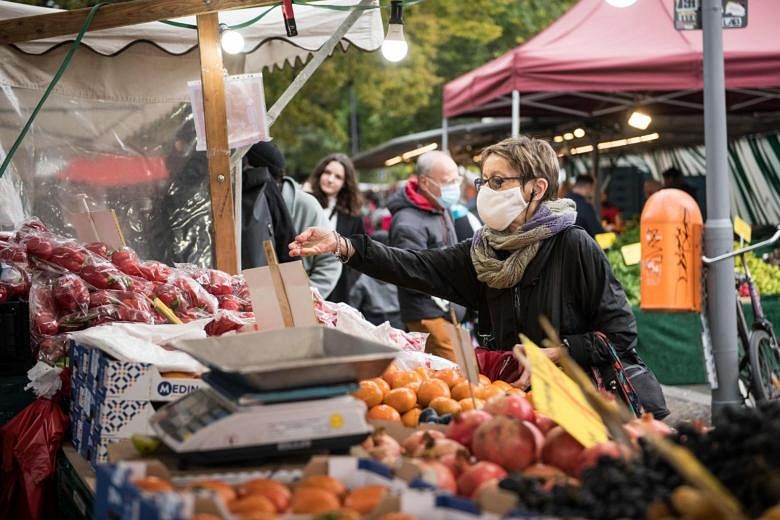BERLIN - Anxious to avoid another lockdown, European politicians are struggling on two fronts. On the one hand, the public is showing increasing signs of so-called Covid-19 fatigue and is questioning restrictions. On the other hand, an intense debate has set in over what political system is best equipped to fight a global disease - a federal or a centralised one.
In a recent survey, the World Health Organisation (WHO) reported that member states across Europe are experiencing exhaustion over the measures to fight the pandemic, sometimes amounting to 60 per cent of their populations. Although seen as a natural reaction to the prolonged nature of the crisis, "it poses a serious threat to efforts to control the spread of the virus", the WHO says.
"Since the virus arrived in the European Region eight months ago, citizens have made huge sacrifices to contain Covid-19," WHO regional director for Europe Hans Henri Kluge said earlier this month.
"It has come at an extraordinary cost, which has exhausted all of us, regardless of where we live, or what we do. In such circumstances it is easy and natural to feel apathetic and demotivated."
For German Chancellor Angela Merkel, the rising carelessness that results in a higher number of infections is a clear warning sign. In her weekly video podcast, she strongly urged her compatriots to strictly observe regulations.
"We must now do everything we can to prevent the virus from spreading out of control. Every day counts," she said.
Dr Merkel's exhortation: "Please refrain from any trip, from any celebration that is not really necessary. Please stay at home, at your place of residence, whenever possible".
With over 380,000 Covid-19 cases and a death toll just shy of 10,000, Germany may still look good in comparison with other EU countries.
The numbers, however, have picked up alarmingly in recent weeks. Some experts are afraid that in order to stop the contagion, another lockdown has to be imposed. Given the damage already done to the economy, this would be the government's last resort.
Other experts believe that the government is exaggerating the threat. "You cannot scare people all the time," Dr Klaus Reinhardt, president of the German Medical Association, said in an interview.
"We must learn to deal and live with an increase in the number of infections."
His worry is crisis fatigue, the upshot being that some people might no longer take warnings seriously.
At the same time, Germany's federal structure has made it increasingly complicated to achieve nationwide agreement on the necessary measures. When local governments of the Lander - states within the German federation - decided in early October to ban overnight stay in hotels for travellers from regions and cities with high infection rates, widespread anger erupted.
For instance, after Berlin was declared a coronavirus hot spot, Berliners were not allowed to check into hotels in Bavaria, Baden-Wurttemberg or even neighbouring Brandenburg.
Conversely, Berlin had put in place a much more lenient policy and was still welcoming travellers from other regions of Germany - even if they originated from high-risk areas.
As a highly decentralised republic, the 16 German states enjoy great autonomy. Although the legal basis for the measures against the pandemic is the federal infection protection law, the actual implementation is the responsibility of the regional states.
In frequent meetings, Dr Merkel has been trying to get the heads of the local governments on board to avoid a hodgepodge of regulations.
This, however, is not always successful. When she asked the prime ministers of the states to agree to a joint response to the recent increase of infections, the Lander refused because of diverging risk assessments. In the end, some went for harsh restrictions, while others were more permissive, leading to great confusion among the people.
The perceived disparity in rights did not go down well either. Hotels, restaurants and private citizens took to the courts and filed lawsuits against local governments.
In many instances regional courts ruled measures like the banning of overnight stay as disproportionate and suspended them. Brandenburg, for example, was forced late last week to repeal the ban and allow Berliners and others into the region. The same happened this week to the Baltic Sea area, a major tourist destination.
The city administration of Berlin suffered a setback itself when an earlier imposed 11pm to 6am curfew for bars and restaurants was overturned by a court a few days ago.
Decentralised governance in neighbouring Spain may also have worked against the country in its pandemic response. The 17 autonomous Spanish regions are worlds apart from forming a strategy in line with the central government in Madrid. In Catalunya, bars and restaurants had to completely shut down last week; they stay open in Madrid, however.
Over in France when Covid-19 numbers skyrocketed, President Emmanuel Macron last week took countermeasures into his own hands and dictated new restrictions such as a nighttime curfew on nine cities including Paris.
Just this summer, he had hailed Germany's federal structure for its flexibility, after the time-consuming reporting system through Paris laid open the weaknesses of the centralised French health system.
Now, Mr Macron is afraid of something even more threatening. French hospitals are already at their limits and are ill-prepared to sustain a second wave.












